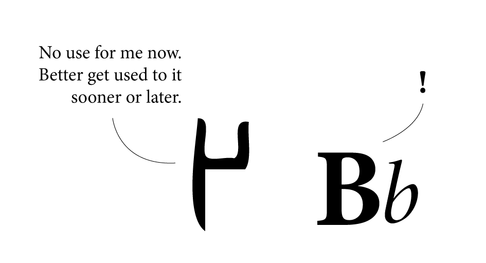|
Just finished proofreading somebody's Diploma (thesis) document. I don't have any right to divulge the topic and the details of it, but part of it was about the development of language, script and how we read letters and words. There is still no really conclusive theory on how language developed. Was it to express emotion, need, signal danger, or for the purpose of trade? Who knows. We don't really know how or why humans started making intelligent sounds and then giving signs to the sounds they made. This was a huge evolutionary leap. Animals too have complex language and communication systems, but human language has developed to an abstract system of signs.
The letter A is just a notion of the sound it represents. The 'A' could well be a square or circle instead of A. At some point in our long and convoluted history somebody decided we needed signs to communicate. And that was the beginning of script. Many scripts developed out of a need to keep accounts for trade purposes. Stringing these signs together in various groups led to the formation of words and sentences. We never really read every letter in a word, we just read the word as a group. Reading is as much about pictures as it is about words, because at the end of the day, words are pictures. When someone asks the spelling of the word, one may actually see the word in their head, and know that if it 'looks' wrong, the spelling is wrong. I know, for instance, the i must come after the e, by the image in my head. If e is before i, my brain recognizes it is visually wrong. It doesn't spell wrongly, it looks wrong. It is easier to know spelling when you visualize it. The images of letters that we know today have developed over thousands of years. We have accepted them as much as we have accepted the noses on our faces. Language (especially one's mother tongue) seems to be hard-wired in us. There is very little effort required in thinking or talking in one's mother tongue. We all learnt language at such a tender age, we usually cannot recollect anything to do with the process. It probably wasn't very hard, or we would have vivid memories of it. Learning a second language however, usually proves harder. Most people remember struggling, or at least making more efforts with Hindi, Marathi, English, French or any other language that they learned a little later. Between the ages of approximately 2 to 6, the 'language window' in little human brains is wide open, more than it will ever be in life again. Between these years, children can effortlessly pick up 3 or 4 languages being spoken around them. No one (or very few) will question why A looks the way it does. Why can it not look like X, or a circle? World over, the speakers of a language have a general, unspoken agreement over the form of letters. Adding or removing a letter from a language is like adding or removing a limb. Generations may pass before people realise the loss of a letter, or even a matra. And by then it may be too late to bring it back. Most people may ask, what's the big deal in the loss of a letter, the language is simply evolving. That may be the case, but the loss is still very real. A letter may not have a tangible value, but it carries a wealth of information, symbology, history, culture and identity with it. Adding a letter is also serious business. First, the need for a new letter needs to be strongly felt by most people. How will people know what a new letter means, unless it is told to them repeatedly? Somehow, words are easily dropped from and added to any working language, but letters, not so easily. The loss of languages is a very real threat to culture and diversity world over. We are illiterate when we look at ancient scripts. The Indus Valley script still has the world flummoxed after thousands of years. Changes in scripts have occurred over millennia, often for very down-to-earth reasons. For instance, Gujarati lost the line on top of the letters that Devnagari has simply because the Gujaratis are predominantly a business and trading community, and the loss of the line enabled them to write faster for maintaining accounts and lists. Similarly, a thousand years from now our alphabet may be completely different. We form the language we speak, but it also forms us.
0 Comments
Leave a Reply. |
Archives
June 2018
Categories
All
LinksThe New Yorker Old Blogs |

 RSS Feed
RSS Feed
